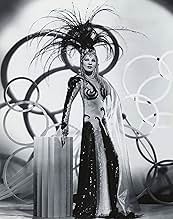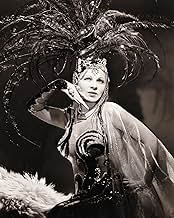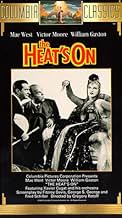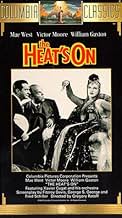CALIFICACIÓN DE IMDb
5.1/10
454
TU CALIFICACIÓN
Cuando su estrella más importante se une al espectáculo de un rival, un productor de Broadway fanfarronea y planea recuperarla.Cuando su estrella más importante se une al espectáculo de un rival, un productor de Broadway fanfarronea y planea recuperarla.Cuando su estrella más importante se une al espectáculo de un rival, un productor de Broadway fanfarronea y planea recuperarla.
- Dirección
- Guionistas
- Elenco
Leon Belasco
- Shore - the Agent
- (sin créditos)
Beatrice Blinn
- Babette
- (sin créditos)
Opiniones destacadas
Although Mae West receives first billing, she is not on screen long enough to make this misfire worth seeing. Even when she is on display and looking svelte and glamorous at 50, her lines lack the double-entendres and sly delivery of her best work. The silly goings on in this back-stage "comedy" revolve around financing a theatrical production with money from a blue-nose group whose goal is to suppress such shows. The plot is muddled at best, ridiculous at worst, and the cast lacks either a romantic lead such as Cary Grant or a comic like W.C. Fields for Miss West to play off. The production numbers for the most part are forgettable, even when Mae West delivers the songs. The one exception is the dazzling piano playing by Hazel Scott. Her number with two pianos is nothing short of astonishing and almost makes the dreck one has to endure before her appearance almost bearable. Unfortunately, Scott has only two numbers, but mercifully the film ends rather abruptly not long after she exits the screen. "The Heat's On" is certainly an ironically mis-titled film considering the heat that West generated in her early work, and the movie is only for die-hard West fans who are interested in seeing everything that she appeared in. Entertainment seekers and non-West fans beware.
THE HEAT'S ON (Columbia, 1943), directed by Gregory Ratoff, gives some indication as to how the use of a major star heading the cast might promote theatrical attendance, but the final result turns out to be a demotion of its reputation. The star in question is Mae West returning to the big screen after a three year hiatus following her western comedy classic of MY LITTLE CHICKADEE (Universal, 1940) opposite W.C. Fields. Appropriately titled, especially for a Mae West movie, THE HEAT'S ON should be categorized as a Mae West movie not to be a Mae West movie. A throwback to her motion picture debut of NIGHT AFTER NIGHT (Paramount, 1932), where West's character arrives late into the story, allowing the leading actors, as headed by George Raft, to be showcased to best advantage in his first starring role, but at least with West's limitations reciting her own one-liners made the movie watchable. For this production, she surprisingly has very little to do, practically taking the back seat to other performers, and in spite of some of her traditional witty one-liners, usually the best part of her movies, there isn't enough of her or her sayings to produce any highlights. In one scene, West says "If I stay with this show, I'll ruin my reputation." A pity she didn't take her own advice. Eight movies and 11 years later, Mae West continued to receive star billing above the title, but this time has her name shared along with Victor Moore and William Gaxton. Now at age 50, and appearing physically younger than in her previous films, especially now sporting a Betty Grable-type headdress, but never exposing her legs wearing those long styled dresses, there's very little of her to recommend. Had this Columbia musical starred studio contract players as Ann Miller or Evelyn Keyes, then THE HEAT'S ON would have been just another one of those hundreds of slightly entertaining hodgepodge musicals churned out during the World War II era, but with Mae West's name on the marquee, the final result is quite disappointing.
Story: Believing that her forthcoming musical, "Indiscretions" is destined to flop, its leading actress, Fay Lawrence (Mae West), decides to leave producer Tony Ferris (William Gaxton), to star in a revue, "Tropicana," for rival producer Forrest Stanton (Alan Dinehart). Following the opening minutes which sets the pattern to the story, the duration revolves mostly around Tony trying to get Fay back while Fay sits inside the theater with Stantion to watch numerous talented celebrities auditioning in musical acts planned for the show. In between acts, the story shifts over to Hubert Bainbridge (Victor Moore), a middle-aged man attempting to get his niece, Janie (Mary Roche) to be headlined in Tony's show. In spite of his moral-minded sister (Almira Sessions) wanting to close the show, Janie really prefers her soldier boyfriend, Andy Walker (Lloyd Bridges), than a show business career anyway, thus leaving Tony with no headliner.
On the musical program, songs include: "I'm a Stranger in Town" (sung by Mae West); Specialty number conducted by Xavier Cugat with Lina Romay vocalizing in Spanish; "There Goes That Guitar, There Goes My Heart," "Antonio" (both sung by Romay); "The White Keys and the Black Keys" (sung and performed by Hazel Scott on piano); "Thinking About the Wabash" (sung by Mary Roche and male singer); "The Cailssons Go Rolling Along" (a military number sung by Hazel Scott/ performed by black soldiers); "They Looked So Pretty on the Envelope" (sung by Victor Moore); "Hello, Mi Amigo" (finale with Mae West and chorus). So many songs, none for the hit parade.
Out of circulation on the television markets in nearly 40 years, and distributed on video cassette for a limited time during the early 1990s, THE HEAT'S ON was resurrected again, thanks to Turner Classic Movies cable channel, where it premiered the evening of April 25, 2005. In spite of many negative reviews, then and now, it's good having it resurrected again mainly because Mae West had taken part in it. After viewing THE HEAT'S ON, it's quite understandable why West preferred to ignore it as part of her filmography. But the failure should not be blamed entirely on West. According to Bob Osborne's opening and closing statements, West had no say in the matter, having committed herself into doing this without reading the script, simply as a favor to director Gregory Ratoff (who played her Russian attorney in one of her best comedies, I'M NO ANGEL back in 1933). The only thing going for THE HEAT'S ON is the humorous scene involving West as she entertains Victor Moore in her boudoir by dancing the rumba, and at the same time, he trying to keep his toupee from clipping off. There are some instances near the start of the story where West is expected to make a nifty comeback in between conversations with Gaxton, but with some of the wittier lines going to Gaxton, there appears to be either abrupt fade-outs or cuts to the next scene to prevent West from saying anything worth hearing. Some West quips have made it to the finished product, others haven't. A pity.
With this almost marking the end to Mae West's movie career, this would not be her finish, not by a long shot. She continued to perform on stage and night clubs throughout the years, returning to the big screen with MYRA BRECKENRIDGE (1970) and SEXTETTE (1978), none recapturing the magic she fulfilled during the Depression era 1930s, the sort of movies West fans prefer to remember her best. (**1/2)
Story: Believing that her forthcoming musical, "Indiscretions" is destined to flop, its leading actress, Fay Lawrence (Mae West), decides to leave producer Tony Ferris (William Gaxton), to star in a revue, "Tropicana," for rival producer Forrest Stanton (Alan Dinehart). Following the opening minutes which sets the pattern to the story, the duration revolves mostly around Tony trying to get Fay back while Fay sits inside the theater with Stantion to watch numerous talented celebrities auditioning in musical acts planned for the show. In between acts, the story shifts over to Hubert Bainbridge (Victor Moore), a middle-aged man attempting to get his niece, Janie (Mary Roche) to be headlined in Tony's show. In spite of his moral-minded sister (Almira Sessions) wanting to close the show, Janie really prefers her soldier boyfriend, Andy Walker (Lloyd Bridges), than a show business career anyway, thus leaving Tony with no headliner.
On the musical program, songs include: "I'm a Stranger in Town" (sung by Mae West); Specialty number conducted by Xavier Cugat with Lina Romay vocalizing in Spanish; "There Goes That Guitar, There Goes My Heart," "Antonio" (both sung by Romay); "The White Keys and the Black Keys" (sung and performed by Hazel Scott on piano); "Thinking About the Wabash" (sung by Mary Roche and male singer); "The Cailssons Go Rolling Along" (a military number sung by Hazel Scott/ performed by black soldiers); "They Looked So Pretty on the Envelope" (sung by Victor Moore); "Hello, Mi Amigo" (finale with Mae West and chorus). So many songs, none for the hit parade.
Out of circulation on the television markets in nearly 40 years, and distributed on video cassette for a limited time during the early 1990s, THE HEAT'S ON was resurrected again, thanks to Turner Classic Movies cable channel, where it premiered the evening of April 25, 2005. In spite of many negative reviews, then and now, it's good having it resurrected again mainly because Mae West had taken part in it. After viewing THE HEAT'S ON, it's quite understandable why West preferred to ignore it as part of her filmography. But the failure should not be blamed entirely on West. According to Bob Osborne's opening and closing statements, West had no say in the matter, having committed herself into doing this without reading the script, simply as a favor to director Gregory Ratoff (who played her Russian attorney in one of her best comedies, I'M NO ANGEL back in 1933). The only thing going for THE HEAT'S ON is the humorous scene involving West as she entertains Victor Moore in her boudoir by dancing the rumba, and at the same time, he trying to keep his toupee from clipping off. There are some instances near the start of the story where West is expected to make a nifty comeback in between conversations with Gaxton, but with some of the wittier lines going to Gaxton, there appears to be either abrupt fade-outs or cuts to the next scene to prevent West from saying anything worth hearing. Some West quips have made it to the finished product, others haven't. A pity.
With this almost marking the end to Mae West's movie career, this would not be her finish, not by a long shot. She continued to perform on stage and night clubs throughout the years, returning to the big screen with MYRA BRECKENRIDGE (1970) and SEXTETTE (1978), none recapturing the magic she fulfilled during the Depression era 1930s, the sort of movies West fans prefer to remember her best. (**1/2)
I'm a big fan of Mae West, and I waited for years to see this insignificant, forgettable little movie. Although I knew it had gotten bad reviews at the time of its release--- and West herself didn't like it any more than the critics did--- I thought there still might be something in it worth seeing, since it holds such an important place in her career: this was the final movie of her 1930s/1940s "movie star" period. After it was done, West returned to live stage work, recording sessions, and of course her famous nightclub act of the 1950s. She was not to make another film for 27 years (at which time she did the rather infamous "Myra Breckinredge" in 1970).
Seeing "The Heat's On" is an exercise in tedium. I had to literally struggle to stay awake during it. It's not that it's all that horrendously "bad"--- heck, even bad movies can be entertaining for the wrong reasons. This one is just....empty. Completely vapid and forgettable. It's easy to understand why Mae West practically disowned this movie.
The main thing wrong with it is that she isn't in it nearly enough. For the entire first hour, I swear that West had about 6 minutes of total screen time, scattered throughout in a series of VERY short "blink and you'll miss it" scenes. She's got more charisma and screen presence, by far, than anybody else in this thing--- when she's on, you can't take your eyes off her. But you hardly get to see her! Giving West more screen time would have improved this movie immensely, and it's a mystery to me why director Gregory Ratoff didn't understand that.
What makes her absence from the screen even more frustrating, if not downright puzzling, is that so much of this movie is a revue/type *musical* (in neon lights), the type of film that could have shown her at her absolute best. But instead you get one lame song after the other filling the screen; there are singers, dancers, production numbers, showgirls, Latin-flavored guitarists, even a boogie-woogie pianist/singer (blues and jazz great Hazel Scott, playing herself). They all come in, do their thing, leave, and it's on to the next song. With the singular exception of Scott, who is wonderful--- all of this is absolutely and completely forgettable. Most of the singers, the dancers, the songs, the movie itself: it's "B"-grade material at best. We aren't talking MGM-quality here, folks.
Watching this parade of musical mediocrities go by, all you can think of the entire time is "Where IS Mae West??! Why don't they bring her on?" But it never happens until the very end, at which time you'll be practically asleep if you've managed to sit through it all up to that point. It's hard to imagine who might be a fan of this picture.
For what it's worth, West does look pretty good. Always proud of her youthful appearance, she was 50 years old here, but she looks maybe 40-ish, and she's dressed in stylish, contemporary clothes for one of the very few times in her screen career. (Well, except for her very first musical number, in which--- amusingly--- she's in her trademark "gay 90s" garb, looking much like she did in her earlier films).
The story--- what flimsy plot there is of it--- has something to do with Broadway musical star Fay Lawrence (West) getting funding for her next show, and having producers fight over her. But the main point of this movie, and the most amount of screen time, is devoted to the endlessly boring musical numbers. Gentle, befuddled Victor Moore is the primary male lead; and a YOUNG Lloyd Bridges--- yes, he was young once!--- has a featured part as a soldier engaged to Moore's niece.
Not a bad movie, just a boring one, and it missed the boat all around. Mae West deserved better.
Seeing "The Heat's On" is an exercise in tedium. I had to literally struggle to stay awake during it. It's not that it's all that horrendously "bad"--- heck, even bad movies can be entertaining for the wrong reasons. This one is just....empty. Completely vapid and forgettable. It's easy to understand why Mae West practically disowned this movie.
The main thing wrong with it is that she isn't in it nearly enough. For the entire first hour, I swear that West had about 6 minutes of total screen time, scattered throughout in a series of VERY short "blink and you'll miss it" scenes. She's got more charisma and screen presence, by far, than anybody else in this thing--- when she's on, you can't take your eyes off her. But you hardly get to see her! Giving West more screen time would have improved this movie immensely, and it's a mystery to me why director Gregory Ratoff didn't understand that.
What makes her absence from the screen even more frustrating, if not downright puzzling, is that so much of this movie is a revue/type *musical* (in neon lights), the type of film that could have shown her at her absolute best. But instead you get one lame song after the other filling the screen; there are singers, dancers, production numbers, showgirls, Latin-flavored guitarists, even a boogie-woogie pianist/singer (blues and jazz great Hazel Scott, playing herself). They all come in, do their thing, leave, and it's on to the next song. With the singular exception of Scott, who is wonderful--- all of this is absolutely and completely forgettable. Most of the singers, the dancers, the songs, the movie itself: it's "B"-grade material at best. We aren't talking MGM-quality here, folks.
Watching this parade of musical mediocrities go by, all you can think of the entire time is "Where IS Mae West??! Why don't they bring her on?" But it never happens until the very end, at which time you'll be practically asleep if you've managed to sit through it all up to that point. It's hard to imagine who might be a fan of this picture.
For what it's worth, West does look pretty good. Always proud of her youthful appearance, she was 50 years old here, but she looks maybe 40-ish, and she's dressed in stylish, contemporary clothes for one of the very few times in her screen career. (Well, except for her very first musical number, in which--- amusingly--- she's in her trademark "gay 90s" garb, looking much like she did in her earlier films).
The story--- what flimsy plot there is of it--- has something to do with Broadway musical star Fay Lawrence (West) getting funding for her next show, and having producers fight over her. But the main point of this movie, and the most amount of screen time, is devoted to the endlessly boring musical numbers. Gentle, befuddled Victor Moore is the primary male lead; and a YOUNG Lloyd Bridges--- yes, he was young once!--- has a featured part as a soldier engaged to Moore's niece.
Not a bad movie, just a boring one, and it missed the boat all around. Mae West deserved better.
It took three credited screenwriters to come up with this flaccid comedy-musical from Columbia--and not one of them apparently had a sense of humor. Perhaps taking a page from Mae West's real-life tangles with the censors, the bawdy, naughty comedienne is toned way down here in a plot about a musical stage performer who finds herself stuck in a bomb and blames her manager; he gets a bright idea and has the show raided for indecency to drum up business, but the gag goes too far and the show is closed for good. At this point, the foolish scenarists practically lose track of Mae, which is the most indecent thing about the picture! She pops up intermittently, talking on the phone or sitting idly in the theater, but all her charm and smarm has been extinguished (she retired from films for twenty-seven years after this). The manager weasels show money out of a good-natured schnook and puts on a new revue (a nice wholesome one)--and even gets West back in the spotlight--but it's too late. The movie has collapsed around everyone like an exhausted house of cards. *1/2 from ****
This mild little film is like untold dozens of minor musicals from the 1940's that were ground out by Columbia and Universal and pretty much forgotten and unseen since original release. What keeps this one in circulation is the fact that it top lines no less than Mae West, one of the cinema's greatest women stars. West was now on the eve of 50 when the movie was made, a good 20 years and then some older than most of the pinup girls that were packing in the moviegoers of the era. Presumably her limited options in Hollywood at the time persuaded to take a chance on this Gregory Ratkoff production. She took the project seriously enough to slim down, looking sensational in some gorgeous Walter Plunkett gowns and clearly spiced up some of her scenes with some uncredited but unmistakable original wisecracks. Alas, far too much time is given to musical numbers by other performers although glamorous black jazz artist Hazel Scott is fantastic in her productions. There is also perhaps a bit too much time given to the male leads, William Gaxton and Victor Moore, highly regarded Broadway stars of the era (co-stars in fact in four stage hits) but not actors who can carry a film. Even though the cast is talented and some of the musical numbers are quite good (I actually enjoyed Moore's comic number "They Never Look as Pretty as the Package"), you keep waiting for Mae West to appear on the scene again. I suspect this was true even in 1943 when her popularity was at a low point.
Mae West nevertheless manages to score some wonderful moments, notably the comic scene when Victor Moore comes up to see her sometime. Almost as good is West's confrontational scene with Moore's blue nose sister, character actress Almira Sessions. (It's interesting to note the film is one of the few times West is surrounded by performers older than herself, Gaxton, Sessions, and Moore have several years on her which may be part of the reason West looks fairly youthful in the movie in addition to being well-preserved). Starlet Mary Roche is featured as Moore's niece who longs for a show business career, her one musical number "Walbash" is actually quite pleasant but this is apparently her only film appearance, she later became a hairdresser in the film industry if that is indeed the same Mary Roche.
Some like it hot and this movie ain't so hot but we have so few Mae West movies to enjoy it is to be cherished in a way for another glimpse at one of America's great pop culture phenomenons.
Mae West nevertheless manages to score some wonderful moments, notably the comic scene when Victor Moore comes up to see her sometime. Almost as good is West's confrontational scene with Moore's blue nose sister, character actress Almira Sessions. (It's interesting to note the film is one of the few times West is surrounded by performers older than herself, Gaxton, Sessions, and Moore have several years on her which may be part of the reason West looks fairly youthful in the movie in addition to being well-preserved). Starlet Mary Roche is featured as Moore's niece who longs for a show business career, her one musical number "Walbash" is actually quite pleasant but this is apparently her only film appearance, she later became a hairdresser in the film industry if that is indeed the same Mary Roche.
Some like it hot and this movie ain't so hot but we have so few Mae West movies to enjoy it is to be cherished in a way for another glimpse at one of America's great pop culture phenomenons.
¿Sabías que…?
- TriviaThis was Mae West's final film until Myra Breckinridge (1970) 27 years later.
- ErroresOn a wall of a producer's office is a presumably old publicity shot of Fay wearing an elaborate headdress that she doesn't actually wear until she performs a musical number later in film for an entirely new production staged by rival producer.
- Citas
Fay Lawrence: [In the finale, Hello, Mi Amigo:] If you want things put in order, come and see me, south of the border.
- Bandas sonorasI'm Just a Stranger in Town
(1943)
Music by Jay Gorney
Lyrics by Henry Myers and Edward Eliscu
Copyright 1944 by Mills Music Inc.
Performed by Mae West (uncredited) in the show "Indiscretions"
Selecciones populares
Inicia sesión para calificar y agrega a la lista de videos para obtener recomendaciones personalizadas
Detalles
- Tiempo de ejecución1 hora 19 minutos
- Color
- Relación de aspecto
- 1.37 : 1
Contribuir a esta página
Sugiere una edición o agrega el contenido que falta

Principales brechas de datos
By what name was Sinfonías dislocadas (1943) officially released in India in English?
Responda


































